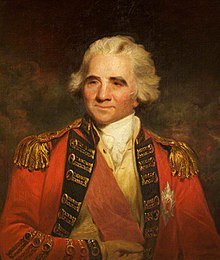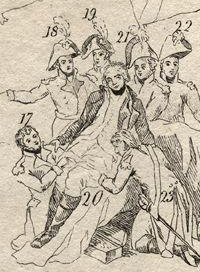Ralph Abercromby

Sir Ralph Abercromby KB (born October 7, 1734 in Menstrie , Clackmannanshire , Scotland , † March 28, 1801 in Alexandria , Egypt ) was a British general .
Life
Ralph Abercromby was the eldest of six children of lawyer George Abercromby of Tullibody, Clackmannanshire and his wife Mary, daughter of Ralph Dundas, Esq. from Manor. His father, a descendant of the Abercrombies of Birkenbog, was born in 1705, admitted to the bar in 1728, and died on June 8, 1800 at the age of 95 as the oldest member of the judiciary. He was the Whig Party's largest landowner in County Clackmannan. By marrying a Dundas, he had increased his political influence considerably. Ralph was born on October 7, 1734 in the old mansion at Menstrie (or Menstry ), his parents' usual place of residence. Other children were the general and commander-in-chief in India Robert Abercromby and the lord judge Alexander Abercromby . The day Ralph was born is not recorded in the Logie parish registers, but he was baptized on October 26, 1734.
After attending school in rugby , Abercromby studied law in Edinburgh and Leipzig (1754) to become a lawyer, like his father and grandfather. But since he was more interested in the military than in law, his family bought him a job as a cornet with the 3rd Dragoon Guards in March 1756 . His patent is dated March 23rd of that year. In February 1760 he received a lieutenant position in the same regiment and in April 1762 as a captain in a company in the 3rd regiment on horseback. In 1770 he was major, and in 1773 Lieutenant Colonel ( Lieutenant-Colonel ). In 1780 he received the rank of Brevet Colonel and the following year that of a regular colonel in the 103rd Regiment ( King's Irish Infantry ). This newly established regiment was reduced in 1783 after the Peace of Versailles (→ American War of Independence ) - like many regiments - and Colonel Abercromby was given half pay. Promoted to major general in September 1787 , he served in 1793 under Frederick Augustus, Duke of York and Albany , in the Netherlands , distinguished himself at Famars and covered the retreat of the Allies over the Waal.
In 1795 he succeeded Charles Gray as Commander in Chief of the British troops in the West Indies . For two years he fought successfully against the French there . In February 1797 he took the Spanish island of Trinidad from the Spaniards without a fight . In the spring of the same year he became governor on the Isle of Wight and soon afterwards Commander-in-Chief in Ireland. Unable to restrain the indulgence of the troops, and personally offended, he soon resigned. Sent to North Holland under the Duke of York , he forced the landing of British and Russian troops, contributed greatly to the victory at Alkmaar , and the fact that York did not listen to his advice was generally attributed to the unfortunate evacuation treaty. In 1800 he commanded the unsuccessful expedition against Cadiz , in 1801 he went with 18,000 men against the French to Egypt.
He appeared at Abukir on March 2, but was not able to land until March 8 , when he forced General Louis de Friant to retreat to Alexandria . On March 21, he defeated the French under Jacques-François Menou , but was mortally wounded and died on March 28. His remains were buried in Malta and his memory was honored with a memorial in St Paul's Cathedral in London .
On May 28, 1801 to the day, two months after his death, his widow, Mary Anne († 1821) in his stead as Baroness Abercromby of Aboukir and of Tullibody in the County of Clackmannan in the hereditary nobility raised. After her death in 1821, this dignity passed to her eldest son, George, a lawyer.
Another son was the politician James Abercromby, 1st Baron Dunfermline (1776-1858).
literature
- James Abercromby: Lieutenant-General Sir Ralph Abercromby KB 1793-1801 - A Memoir by His Son . Edmonston and Douglas, Edinburgh 1861.
Individual evidence
- ↑ Abercromby, Sir Ralph . In: Encyclopædia Britannica . 11th edition. tape 1 : A-Androphagi . London 1910, p. 44 (English, full text [ Wikisource ]).
- ↑ Michael Anthony: Historical Dictionary of Trinidad and Tobago . Scarecrow Press, London 1997, ISBN 0-8108-3173-2 , pp. 1 .
| personal data | |
|---|---|
| SURNAME | Abercromby, Ralph |
| BRIEF DESCRIPTION | British general |
| DATE OF BIRTH | October 7, 1734 |
| PLACE OF BIRTH | Menstrie , Clackmannanshire, Scotland |
| DATE OF DEATH | March 28, 1801 |
| Place of death | Alexandria , Egypt |
